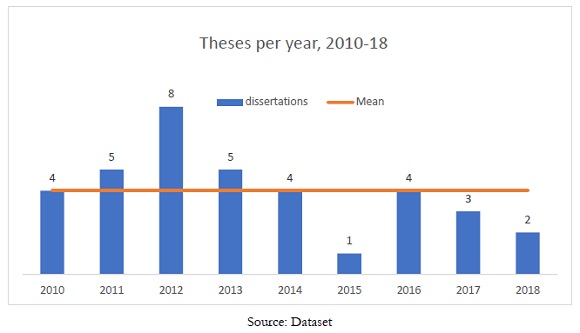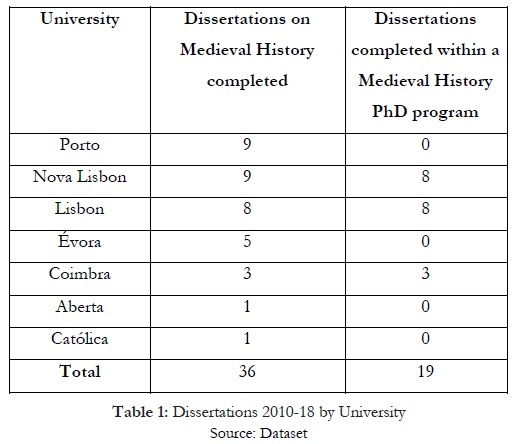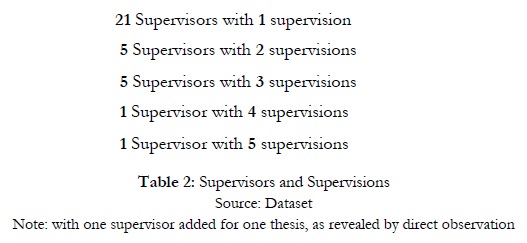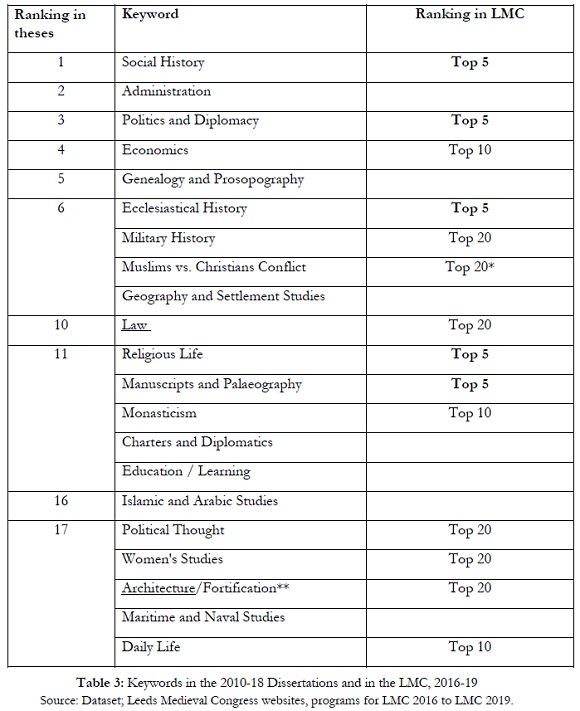Serviços Personalizados
Journal
Artigo
Indicadores
Links relacionados
Compartilhar
e-Journal of Portuguese History
versão On-line ISSN 1645-6432
e-JPH vol.17 no.2 Porto dez. 2019
https://doi.org/10.26300/0y8r-pv20
INSTITUTIONS AND RESEARCH
Theses in medieval history, 2010-2018: an overview [1]
António Castro Henriques2
2 University of Porto, Faculty of Economics and CEPESE, Portugal. E-Mail: ahenriques@fep.up.pt
ABSTRACT
The present paper provides a critical overview of the 36 medieval history dissertations concluded at Portuguese universities between 2010 and 2018. Their comparatively modest numbers (825 theses were completed in history) show the low productivity of the country’s PhD programs in medieval history. Their small numbers notwithstanding, this crop of dissertations can be considered innovative: they brought forth research issues that were not a priority for earlier historiographical generations. Also, the themes studied were well integrated with international research trends on medieval history.
Keywords: Medieval History; Historiography; Methodology
RESUMO
Este artigo apresenta uma síntese crítica das 36 dissertações em história medieval defendidas nas universidades portuguesas entre 2010 e 2018. O seu número relativamente modesto (foram defendidas 825 teses em história) revela a reduzida produtividade dos programas doutorais em história medieval. Ainda que diminuto, este conjunto de dissertações pode ser considerado inovador. A maior parte dos doutorados não se limitou a replicar os modelos das décadas anteriores, antes contribuiu com temas de pesquisa que não eram prioritários para os historiadores da geração anterior. Do mesmo modo, os assuntos estudados estão bem alinhados com as tendências internacionais dentro do campo da história medieval.
Palavras-chave: História Medieval; Historiografia; Metodologia
The present paper provides an overview of the theses on Medieval History that were successfully concluded in the period from 2010 to 2018 at Portuguese universities. The overview is built on a dataset (henceforth referred to as Dataset) supplied by the editors. This Dataset contains the main descriptive variables (supervisors, titles, keywords, university, year) of dissertations in medieval history, to which I have made two additions: firstly, as keywords were regrettably missing in many dissertations and carelessly chosen in others, I assigned keywords following the system used in the Leeds Medieval Congress; secondly, I consulted the theses (when available) in order to discover whether they received funding from the Fundação para a Ciência e a Tecnologia (the Foundation for Science and Technology, henceforth referred to as FCT).
This critical overview assesses whether the 2010-18 crop of dissertations contributed to the advance and consolidation of knowledge in this field of study. Section 1 will provide an overall view, leaving section 2 to address the integration of these dissertations within the doctoral programs. Section 3 explores their methodological scope, whilst section 4 highlights the most important contributions of the theses to overall historiography. Section 5 looks at their links with international research.
One final remark should be made, namely that this paper will not assess the relative merits of the individual dissertations on Medieval History. Together, these dissertations constitute an output of Portuguese academia as a whole (candidates, supervisors, examiners, teaching staff, colleagues, archives, libraries, funding bodies) and it is in this capacity that they will be collectively assessed.
1. Brief Description
Between 2010 and 2018, Portuguese universities churned out 825 Ph.D. dissertations in History (and related fields such as Archaeology and Art History), of which only 36 were classified as Medieval History. Thus, theses dealing with the medieval period are a small fraction (4.4%) of the total number of dissertations produced in History and related fields. This diminutive number needs to be seen in context. In contrast to Contemporary and Modern History, which have the highest number of theses (168 and 110, respectively), it is hard to improvise a Ph.D. thesis in Medieval History because the sources are very demanding in terms of both skills and time. This might intimidate some potential candidates and it is known to have played a part in indefinitely delaying or even killing off a handful of promising PhD dissertations already awarded funding with scholarships during this period.
In spite of these caveats, this small figure should be a cause for concern for medieval historians. Medieval History is on a par, or close to parity, with Contemporary/Modern or Early Modern History in terms of the number of teaching hours that it receives at undergraduate level and the importance that it is afforded in most syllabi. Considering that 415 doctoral students wrote their dissertations on either Contemporary, Modern, Early Modern or Medieval periods, the expected number of Ph.D.’s completed in Medieval History would be 138, that is to say 16% of the total number of theses in History in 2010-8 rather than the actual 4.4%.
The large gap between the actual and expected value indicates that, whatever the reasons, Medieval History is not attractive to prospective doctoral students. Equally worrisome is the apparent trend towards a decrease in the number of theses handed in during this nine-year timespan. Graph 1 shows that only in the first five years was the average number of four dissertations per year exceeded, while in the last four years this number was either equal to or below average. Nevertheless, it is important to stress that this is only a small sample being considered over a short period of time, so this “trend” might be deceptive.
The reasons for the small number of theses and for its apparent decline go well beyond the scope of the present paper. It could be that the completion rate in Medieval History is significantly lower than for the other periods. More likely, negative career expectations play a part in the reduced demand for the available medieval Ph.D. programs and supervisors. If so, the directors of doctoral programs and the supervisors should do their best to dispel this negative perception and strengthen the share of transferable skills and knowledge in postgraduate courses. Curiously, a recent controversy brought up the fact that Medieval History is overrepresented among the most high-ranking political positions in the United Kingdom.[3]
Still, it is important to stress that the problem with Medieval History dissertations is one of quantity, not of merit. In fact, considering the criteria set by the FCT for awarding scholarships, Ph.D. projects in Medieval History are competitive: about half of the theses completed benefitted from funding from the FCT.[4] Given that the application rules set by the FCT favor students with good grades at the BA level, this indicates that the possibility of completing a thesis in medieval history attracts strong candidates.
2.Integration into the Programs
Three quarters of the theses in Medieval History have come from three universities: University of Porto, Nova University of Lisbon (UNL), and University of Lisbon. However, only the latter two have a doctoral program in Medieval History. Throughout this period, the three doctoral programs in Medieval History (Coimbra, Lisbon, Nova) produced a grand total of 19 theses,[5] roughly half of the existing dissertations, as shown in Table 1. This means that the other half of the dissertations result from a deliberate and possibly idiosyncratic choice of candidates within a broader PhD program in History. This has potentially negative implications for the historiographical relevance of their dissertation, as students in a broad history program might shy away from the highly specialized research agendas of today.
The existence of different doctoral programs is not a reflection of major fault lines within the university system. The high number of scholars involved in the supervision of these 36 dissertations (33) reveals that Medieval History scholars operate across faculty borders. Thus, medievalists are putting to good use the large capacity built up in Medieval History over previous decades (Mattoso 2011: 11-2; Freitas 2011: 620-2). The reason for this high number is that, contrary to what was the norm in the previous period, half of the dissertations had more than one supervisor. Whatever the actual inputs of each concrete co-supervisor, this situation clearly represents an appeal to external expertise: of the seventeen dissertations with co-supervision, twelve had supervisors from other universities (including six from foreign universities). Also, no less than five dissertations included specialists from other faculties or from other periods within the same university. Table 2 shows the distribution of supervisions between supervisors.
Note: with one supervisor added for one thesis, as revealed by direct observation
The flipside of this broad participation in a very small number of dissertations is the dispersion of the research agenda. Only twelve supervisors have seen the completion of more than one dissertation in Medieval History during this period. Together with the relatively scant output of the medieval doctoral programs, this provides further confirmation that medieval history dissertations are not only scarce, but also that their total number is also well below the overall capacity of medievalists. Even three PhD thesis supervisions in nine years can hardly be considered a maximum utilization of resources.
3. Scope
As mentioned, one half of the dissertations come from outside the PhD programs in Medieval History. Across the academia, the agenda of cutting-edge research developed by the leading scholars is brought to them by their students through PhD programs, regardless of their individual merits. As such, Ph.D. programs contain well-defined research issues and targets that make the accumulation of studies meaningful and allow for advances in the field. In the absence of such goals and guidelines, random individual preferences prevail and outputs become less coherent, however skilled and well-trained some of the candidates might be. As such, we must question whether the fact that half of the dissertations did not originate in a doctoral program in Medieval History had a negative impact on the relevance of the research.
As predicted, doctoral programs implied stricter research agendas. A set of 22 of these Ph.D. theses can be considered case studies, i.e. research in which the unit that is studied is selected as an instance of a concrete problem and the methodology is chosen accordingly. In fact, 12 of these case studies stem from doctoral programs in Medieval History. The remaining 14 theses are not uniform from a methodological standpoint. Four can be considered monographs and the rest can be considered exploratory syntheses. In contrast to case studies, which are bound and constrained by the unit of study, exploratory syntheses combine methodologies in order to understand a given, concrete event, period, process, or culture. From a historiographical perspective, these exploratory syntheses appear to have been designed to plug gaps in knowledge. While not all are necessarily innovative or well-designed, they often tread paths that are somewhat removed from the normal research agendas in a way that case studies do not.
In the present situation, it can be argued that the exploratory syntheses and case studies have loosened the grip that structuralism imposed upon research into this historical period. Systematic data for the earlier period is not available and hence a systematic comparison with the previous years is impossible. Nevertheless, the previous decades saw the development of a dissertation model grounded in the French medievalist tradition that was highly influential in continental Europe: well-defined units subjected to layers of interrelated research avenues (administrative, economic, social, geographical, and political) during long timespans (often just simply described as being “in the Middle Ages”). Research questions were very broad, rather than carefully formulated, and the overall methodological design was secondary (although the concrete methodologies used in the different sections were often very sophisticated). This “total history” model was applicable to ecclesiastical institutions, towns, and, typically, regions. While this proved an expedient way of dealing with the maze of Portuguese sources, it had two serious shortcomings: it discouraged attention to non-structural changes and did not bind students to specific methodologies designed to answer problems highlighted by the historiography.
The new dissertations largely represented a break with this methodological tradition. Overall, the theses come across as far more bounded exercises, aimed at more specific research questions, and more rigorous in their choice of methodologies. By our reckoning, of the 36 dissertations that were completed, only 11 adhered to this “total history” structure.
4. Topics
In spite of their small numbers and the looseness of their research agendas, many of the 2010-18 medieval history dissertations made inroads into recent or little-explored topics. The selection of topics is arguably the most innovative feature of this new generation of Ph.D. theses. As mentioned, the typical dissertation of the previous generations was built around the unit of study rather than its subject, and combined layers of different questions and methodologies (economic, administrative, political, geographical, and social). In the present population, not only did the topics become more important, but some candidates also dedicated their research to issues that occupied a distinctly minor position in the track record of Portuguese historiography on the medieval period.
One area that exerted a strong attraction for the new PhDs was religious history proper. Tellingly, in the landmark Historiography of Medieval Portugal (HMP), religious history was emmeshed with ecclesiastical history. Curiously, the authors of the relevant article in the HMP even observed that “the history of religious practices seems unlikely to attract the attention of fresh researchers” (Rosa and Vilar, 2011: p. 347). Despite these negative expectations about the contents of dissertations, “religious life” and “lay piety” together are on an equal footing with “ecclesiastical history” in the keywords for 2010-18, with seven each. In this field of study, the shift from studying individual religious houses to focusing on religious orders proved to be a fruitful methodological move. By “zooming outside” the monastery walls, these historians covered the interaction between the state, the church structure, and lay religiosity, to some extent replicating what had happened to the religious military orders in earlier generations.
Economic history is a remarkable example of a relatively forgotten topic attracting the attention of candidates and being taken to levels that were unprecedented in previous decades. The University of Porto provided two exploratory syntheses: one on the Atlantic Trade and another on textile production, as well as a much-needed case study on Portuguese prices and wages. The University of Lisbon provided another exploratory synthesis on the “crisis” of the fourteenth century. Some dissertations on religious orders, regions, and noble households also dedicated sections to the study of economic themes. These dissertations contributed to the current trend of liberating economic history from the straitjacket of the structuraliste research of previous decades (Barata and Henriques 2011: 270).
The recovery of law as an autonomous historiographical subject is also seen in this crop of Ph.D.s. The HMP did not include a separate entry for “Legal History,” and law was subsumed into the article “Central Power: Institutional and Political History in the Thirteenth-Fifteenth Centuries” (Homem, 2011: 197-201). This neglect also extended to areas like constitutional history (Henriques 2009). Even allowing for the fact that one thesis on legal history came from a law faculty, it is noticeable that this subject merited an exploratory synthesis by the University of Porto and a study of the relationship between customary laws and everyday life. Furthermore, the dissertations provided new perspectives on the sociology of learned men (most of whom had a background in law) and on Muslim jurisprudence in a wider context.
Portuguese embassies and their diplomats also merited two case studies aimed at different periods. Interestingly, the authors focused on the social identities of the diplomatic staff and on their relationships with other polities. This represented a welcome addition to a field which was largely underexplored, except for the relations with the papacy and royal weddings (Branco and Farelo, 2011). Diplomatic history thus benefitted from the same prosopographical approach that also proved useful for dealing with subjects such as scholars and municipal elites.
Another important collective trend that can be observed in the dissertations is the reclaiming of diplomatics, paleography, and other auxiliary sciences as effective instruments for investigating the research questions of historians. Using such sciences to sharpen the tools available to historians was among the declared aims of at least four theses. These theses also built upon the already existing capacity.
5. International Trends
For the purpose of comparing the themes of the dissertations with the main international trends in the history written about the period, we classified the 36 theses according to the keywords used in the last four editions of the Leeds Medieval Congress (LMC), which is easily the most wide-ranging conference for medieval historians in Europe. As such, it is a useful benchmark for measuring whether this set of dissertations in is tune with the hottest “international” topics. As Table 3 shows, there is a clear overlap between the two sets of keywords.
Note: given that the Leeds Medieval Congress is also a Medieval Studies conference, we excluded from the above ranking keywords such as Art History, Archaeology, Language and Literature, and Historiography-Medieval. We made some changes in order to better match the two sets: the original LMC topic of the Crusades was replaced by Christian vs Muslim Confrontation; Education and Learning were joined together, as were all the sub-fields of study within Economic History (trade, rural, urban); topics such as fortification or urban planning in Portuguese theses were interpreted as belonging to the field of Architecture.
As reflected in the mirror of the LMC, Portuguese dissertations on Medieval history are in tune with the broader academic community. All the top-5 LMC subjects can be found among the twenty most frequent keywords applicable to Portuguese dissertations. On the other hand, the top-10 LMC keywords are poorly represented here. While the neglect of LMC keywords like “Byzantine Studies” is hardly surprising, the absence of “Gender Studies”, “Mentalities”, “Theology” and the scant interest in “Daily Life” indicate that some areas are underrepresented in the population under study.
The discrepancy between the two sets of keywords should not be a cause for concern in Portuguese historiography. Most importantly, the theses in the Dataset retain a relatively strong interest in subjects such as “Islamic and Arab studies,” “Maritime and Naval Studies,” “Settlement Studies,” and “Confrontation between Christians and Muslims.” Specialization in these topics is welcome as they are especially relevant for Portuguese history and allow the historians of Portugal to contribute to the country’s greater internationalization via specialized networks that are currently very important. Furthermore, this shows that Ph.D. candidates and their supervisors rightly concentrated their efforts in areas in which the Portuguese sources have a comparative advantage, such as genealogy, noble households and prosopography, administration, or geography and settlement studies.
Admittedly, the perspective on internationalization suggested by matching keywords is incomplete. A far more important indicator of internationalization than the topic under study is whether the research questions and the methodology are deliberately chosen in order to participate in the ongoing discussion taking place on the international stage. In this respect, it is clear that some of the theses analyzed appear to have been designed to enable their authors to take part in international debates on specialized fields of study. This is the case with at least twelve, or one-third, of the dissertations under study. In what appears to have been a clear statement of intent, a few of these were even written in English.
When discussing internationalization, it is also worth noticing that no less than fourteen dissertations were written about cross-border topics. In some cases, the researched subject is not even related to Portuguese history, which is remarkable for a historiography that is overly centered on its own (past or present) political borders.
Conclusion
The 2010-18 crop of dissertations can be considered innovative. Guided by their supervisors, the candidates who saw their theses approved in 2010-18 were not simply replicating the tried and tested models of previous decades. Their small numbers notwithstanding, the dissertations handed in during these nine years brought forth research issues that were not a priority for earlier historiographical generations. The capacity that was shown by Ph.D. theses on Medieval History for following a marginally different research agenda from that of the previous generation and one that was more in tune with international topics is a noteworthy collective achievement.
This is probably the silver lining of an institutional flaw-the weak appeal of the doctoral programs and, consequently, the narrow spread of the research agendas. The challenge facing medieval historians, if they want to attract more students, is to broaden the scope of their research agendas and to be ready to join forces with specialists from other historical periods. While the period called the “Middle Ages” only exists within the realms of convention, “medievalists” have very real traditional strengths that might contribute to an overall improvement in Portuguese historiography as a whole.
REFERENCES
Barata, F.T. and A.C. Henriques, (2011). Economic and fiscal history. In José Mattoso (dir), The Historiography of Medieval Portugal (c. 1950-2010). Lisbon: Instituto de Estudos Medievais, Universidade Nova de Lisboa, 261-81. [ Links ]
Branco, M.J.V. and Farelo, M. (2011). Diplomatic Relations. In José Mattoso (dir), The Historiography of Medieval Portugal (c. 1950-2010). Lisbon: Instituto de Estudos Medievais, Universidade Nova de Lisboa, 231-259. [ Links ]
Freitas, J.A.G., (2011). Syntheses, Guides and States of the Art. In José Mattoso (dir), The Historiography of Medieval Portugal (c. 1950-2010). Lisbon: Instituto de Estudos Medievais, Universidade Nova de Lisboa, 607-625. [ Links ]
Henriques, A. C., (2009). A primeira constituição fiscal portuguesa (1250-1370). In Macedo, J.B., Amaral, L., Silva, Á.F.S., Henriques, A.C., Lisbon: Tribuna da História, 197-216. [ Links ]
Homem, A.L.D.C., (2011). Central power: institutional and political history in thirteenth-fifteenth Centuries. In José Mattoso (dir), The Historiography of Medieval Portugal (c. 1950-2010), Lisbon: Instituto de Estudos Medievais, Universidade Nova de Lisboa, 261-81, 179-207. [ Links ]
Mattoso, José, (2011). Medieval Studies in Portugal: An Overview. In José Mattoso (dir), The Historiography of Medieval Portugal (c. 1950-2010), Lisbon: Instituto de Estudos Medievais, Universidade Nova de Lisboa, 11-23. [ Links ]
Trapper, James, (2018). “Is medieval history really bunk? Not if you’re a cabinet minister”, The Observer. History, (online edition: https://www.theguardian.com/education/ 2018/jan/28/medieval-history-robert-halfron-cabinet-ministers ). [ Links ]
Vilar, Hermínia Maria de Vasconcelos Alves and Maria de Lurdes Rosa, (2011). The Church and religious practices practices. In José Mattoso (dir), The Historiography of Medieval Portugal (c. 1950-2010). Lisbon: Instituto de Estudos Medievais, Universidade Nova de Lisboa, 323-348. [ Links ]
Received for publication: 15 September 2019. Recebido para publicação: 15 de Setembro de 2019
Accepted in revised form: 20 October 2019. Aceite após revisão: 20 de Outubro de 2019
NOTES
[1] With an accompanying annex on pages 188-201 prepared by the editors of e-JPH with the assistance of Elsa Lorga Vila (Graduate of University of Evora; Master’s Degree in History-Nova University of Lisbon).
[3] Trapper, James, “Is medieval history really bunk? Not if you’re a cabinet minister,” The Observer. History, 28 January 2018 (online edition: https://www.theguardian.com/education/2018/jan/28/medieval-history-robert-halfron-cabinet-ministers ).[4] Of the 33 theses directly observed, seventeen mentioned that they received support from the FCT, while the remaining sixteen did not. I did not have access to three theses (from Évora, Nova Lisbon, and Porto). FCT also funded few other theses that should have been handed in during this period, but were not.
[5] One thesis at UNL is from the history program.
Annex:
Medieval History
PhD Theses in Portuguese Universities (2010-2018)
Prepared by the editors of e-JPH with the assistance of Elsa Lorga Vila (Graduate of University of Evora; Master’s Degree in History-Nova University of Lisbon)


















